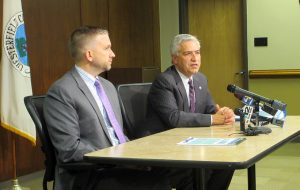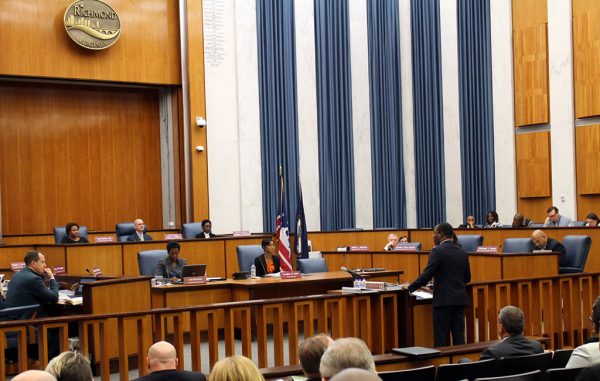The three largest local governments are rolling out their proposed operating budgets for the upcoming fiscal year, each taking different approaches to supporting businesses and encouraging economic investment.
The City of Richmond and Henrico County both are proposing budgets based on maintaining real estate tax rates – $1.20 and 87 cents, respectively, per $100 of assessed valuation – while Chesterfield County is proposing a 1-cent reduction to bring its real estate tax rate to 95 cents per $100 of valuation.
Chesterfield County Administrator Joe Casey said the reduction, which would return the rate to its pre-recession level, is intended as a “thank you” to residents after imposing a higher tax rate in harder times, while also making the rate more competitive in terms of attracting economic investment and retaining existing businesses.
“You don’t have to be the lowest, but you have to compete,” Casey said in a media briefing on his $1.37 billion budget this week. “In lowering a tax rate, those are indices that would pop up from a site consultant saying, ‘Here’s a locality that is actually being mindful of the tax rate and is lowering it.’
“If we’re lowering our tax rate and somebody else isn’t, that’s a momentum factor that we may have,” Casey said. “But there are hundreds of variables, and we have to pay attention of all of those variables as part of our business recruitment and retention.”
In Henrico, County Manager John Vithoulkas’s $1.25 billion budget maintains the county’s 87-cent rate, which he said is the lowest of the largest jurisdictions in the state – the result of six rate reductions since 1978, the last time Henrico increased its rate.
“You don’t get many headlines by going 40 years without ever increasing the tax rate,” Vithoulkas said in his budget presentation to county supervisors Tuesday. “But it gives citizens and businesses a low tax environment and predictability.”

Chesterfield County Administrator Joe Casey, right, discusses the budget alongside deputy administrator Matt Harris. (Jonathan Spiers)
Specific to business, Vithoulkas’s budget would increase the county’s exemption threshold for business license taxes – called BPOL, or Business, Professional, Occupational License taxes – from $200,000 to $300,000 in initial gross receipts.
Vithoulkas said the increase, which would follow a comparable hike this fiscal year from $100,000 to $200,000, would exempt an additional 900 existing businesses from paying the BPOL tax and over 2,300 businesses over a two-year period, adding to more than 13,000 businesses currently exempted from the tax.
The BPOL adjustments follow other business-related tax reductions Henrico has made in recent years, including a 70 percent decrease in its machinery and tools tax rate in fiscal year 2015, a 67 percent decrease in its aircraft personal property tax rate in FY16, and an 89 percent reduction in its data center personal property tax in FY17, Vithoulkas said.
“It needs to be noted that the board’s approval of reducing certain tax rates the past three years has been instrumental in attracting new businesses and jobs to the county,” he said, adding that Henrico ranks No. 2 in the state in number of jobs. “These reductions make our county more competitive in the state, which obviously equates and has equated to more job opportunities for our citizens.”
In Richmond, which operates on a biennial budget, Mayor Levar Stoney proposes maintaining the city’s real estate tax rate at $1.20 per $100 of assessed valuation to produce a general fund budget totaling $715.2 million for FY19 and $710.6 million for FY20.
For comparison, Henrico’s general fund budget makes up $871.9 million of its overall proposal, while Chesterfield’s general fund budget totals $711.7 million.
Richmond’s FY19 general fund budget amount would be a 3.4 percent increase over the current $690.7 million general fund – an increase attributed mainly to the city’s recently adopted meals tax increase that takes effect July 1, the start of the fiscal year. That 1.5 percent increase, from 6 percent to 7.5 percent of every dollar spent at a restaurant in the city, is expected to generate just over $9 million each fiscal year that would be used as leverage to borrow $150 million for new school construction and renovations.
Stoney’s budget proposal also recommends splitting the city’s economic and community development office into two separate departments: an economic development office and a new Department of Housing and Community Development, aimed at putting a greater focus on the city’s housing needs.
The proposal would require funding for a new housing director position and transfer operating funds from the existing office to the new department. The city would also increase its investment in its Affordable Housing Trust Fund, grants from which have been used to help fund such projects as the recent William Byrd building renovation, from $731,000 this fiscal year to $1 million per year in FY19 and FY20.
Stoney also proposes the creation of a new Department of Citizen Service and Response to oversee the city’s 311 Call Center, as well as a Performance Management Office to track policy implementations and improve accountability in City Hall. Stoney also noted improvements budgeted for the city permit center, which recently filled its remaining staff vacancies.
In his presentation to City Council last week, Stoney emphasized a greater focus on housing and community engagement as “a priority for me and my administration.”
Each budget proposal now enters a weeks-long review process by their respective governing board, which will likely tweak the proposals before holding public hearings and voting on the budgets. Each jurisdiction is required to adopt a budget before the start of the fiscal year.
The full budget proposals can be found here for Chesterfield, here for Henrico and here for Richmond.
The three largest local governments are rolling out their proposed operating budgets for the upcoming fiscal year, each taking different approaches to supporting businesses and encouraging economic investment.
The City of Richmond and Henrico County both are proposing budgets based on maintaining real estate tax rates – $1.20 and 87 cents, respectively, per $100 of assessed valuation – while Chesterfield County is proposing a 1-cent reduction to bring its real estate tax rate to 95 cents per $100 of valuation.
Chesterfield County Administrator Joe Casey said the reduction, which would return the rate to its pre-recession level, is intended as a “thank you” to residents after imposing a higher tax rate in harder times, while also making the rate more competitive in terms of attracting economic investment and retaining existing businesses.
“You don’t have to be the lowest, but you have to compete,” Casey said in a media briefing on his $1.37 billion budget this week. “In lowering a tax rate, those are indices that would pop up from a site consultant saying, ‘Here’s a locality that is actually being mindful of the tax rate and is lowering it.’
“If we’re lowering our tax rate and somebody else isn’t, that’s a momentum factor that we may have,” Casey said. “But there are hundreds of variables, and we have to pay attention of all of those variables as part of our business recruitment and retention.”
In Henrico, County Manager John Vithoulkas’s $1.25 billion budget maintains the county’s 87-cent rate, which he said is the lowest of the largest jurisdictions in the state – the result of six rate reductions since 1978, the last time Henrico increased its rate.
“You don’t get many headlines by going 40 years without ever increasing the tax rate,” Vithoulkas said in his budget presentation to county supervisors Tuesday. “But it gives citizens and businesses a low tax environment and predictability.”

Chesterfield County Administrator Joe Casey, right, discusses the budget alongside deputy administrator Matt Harris. (Jonathan Spiers)
Specific to business, Vithoulkas’s budget would increase the county’s exemption threshold for business license taxes – called BPOL, or Business, Professional, Occupational License taxes – from $200,000 to $300,000 in initial gross receipts.
Vithoulkas said the increase, which would follow a comparable hike this fiscal year from $100,000 to $200,000, would exempt an additional 900 existing businesses from paying the BPOL tax and over 2,300 businesses over a two-year period, adding to more than 13,000 businesses currently exempted from the tax.
The BPOL adjustments follow other business-related tax reductions Henrico has made in recent years, including a 70 percent decrease in its machinery and tools tax rate in fiscal year 2015, a 67 percent decrease in its aircraft personal property tax rate in FY16, and an 89 percent reduction in its data center personal property tax in FY17, Vithoulkas said.
“It needs to be noted that the board’s approval of reducing certain tax rates the past three years has been instrumental in attracting new businesses and jobs to the county,” he said, adding that Henrico ranks No. 2 in the state in number of jobs. “These reductions make our county more competitive in the state, which obviously equates and has equated to more job opportunities for our citizens.”
In Richmond, which operates on a biennial budget, Mayor Levar Stoney proposes maintaining the city’s real estate tax rate at $1.20 per $100 of assessed valuation to produce a general fund budget totaling $715.2 million for FY19 and $710.6 million for FY20.
For comparison, Henrico’s general fund budget makes up $871.9 million of its overall proposal, while Chesterfield’s general fund budget totals $711.7 million.
Richmond’s FY19 general fund budget amount would be a 3.4 percent increase over the current $690.7 million general fund – an increase attributed mainly to the city’s recently adopted meals tax increase that takes effect July 1, the start of the fiscal year. That 1.5 percent increase, from 6 percent to 7.5 percent of every dollar spent at a restaurant in the city, is expected to generate just over $9 million each fiscal year that would be used as leverage to borrow $150 million for new school construction and renovations.
Stoney’s budget proposal also recommends splitting the city’s economic and community development office into two separate departments: an economic development office and a new Department of Housing and Community Development, aimed at putting a greater focus on the city’s housing needs.
The proposal would require funding for a new housing director position and transfer operating funds from the existing office to the new department. The city would also increase its investment in its Affordable Housing Trust Fund, grants from which have been used to help fund such projects as the recent William Byrd building renovation, from $731,000 this fiscal year to $1 million per year in FY19 and FY20.
Stoney also proposes the creation of a new Department of Citizen Service and Response to oversee the city’s 311 Call Center, as well as a Performance Management Office to track policy implementations and improve accountability in City Hall. Stoney also noted improvements budgeted for the city permit center, which recently filled its remaining staff vacancies.
In his presentation to City Council last week, Stoney emphasized a greater focus on housing and community engagement as “a priority for me and my administration.”
Each budget proposal now enters a weeks-long review process by their respective governing board, which will likely tweak the proposals before holding public hearings and voting on the budgets. Each jurisdiction is required to adopt a budget before the start of the fiscal year.
The full budget proposals can be found here for Chesterfield, here for Henrico and here for Richmond.


Let’s see a comparison of utility rates, including water.
Please note that the City of Richmond utility is charging a state income tax PILOT of 6% and a federal income tax PILOT of 21%.